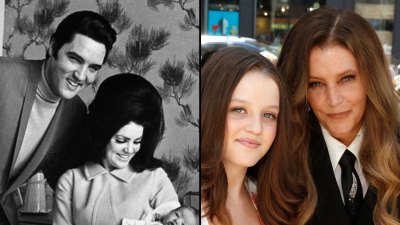
Priscilla, which premiered at the New York Film Festival, earns 3.5 stars (out of 4) from Us Weekly movie critic Mara Reinstein.
If Elvis presented the King of Rock ‘n Roll as a razzle-dazzle music icon struggling with his demons, Priscilla plays like the other side of the record. The softer side. And a necessary one.
Adapted from Priscilla Presley’s 1985 memoir, Elvis and Me, Priscilla is extra-noteworthy because it’s written and directed by Sofia Coppola (Lost in Translation, Marie Antoinette) — an Oscar winner who specializes in depicting women in search of their identities. Her stylistic approach is a 180 degree-contrast from that of Elvis director Baz Luhrmann: Instead of frenetic set pieces in a neon-lit Las Vegas, Coppola gives her audiences warm close-ups of false eyelashes and nail polish bottles and ‘60s-style mod dresses. “Colonel” Tom Parker is only referenced and not seen — whew.
But beyond the candy-coated surface, Priscilla presents a transfixing and tart portrait of marital loneliness set against the backdrop of Elvis’ Graceland estate. And while the heroine at the center is young and wispy-voiced, she’s no fool rushing in.
Their story is so outlandish, you’d be forgiven for assuming some details are exaggerated. Yes, Priscilla Beaulieu (Cailee Spaeny) really was just a pony-tailed 14-year-old living with her parents on a West Germany military base in 1959 when she scored an invitation to a house party hosted by one Elvis Presley (Jacob Elordi). The star, on hiatus for Army service, is instantly smitten. So is she. A short conversation leads to another, which leads to date nights with chaste kisses.
Despite the eyebrow-raising 10-year age gap, the film maintains that Elvis enjoyed Priscilla’s company because he was homesick for the U.S. and grieving his recently deceased mother and she listened intently to his troubles. Even as Priscilla gets older, he doesn’t want to sleep with her. (Again, could this be true? Well, Priscilla herself, now 78, serves as an executive producer.)

This unconventional courtship takes a shocking turn as Elvis asks a then-17-year-old Priscilla to live with him at Graceland in Memphis. To some, the arrangement might seem like a glossy fairy tale — but Coppola is meticulous in revealing all the fascinating cracks.
Elvis gives Priscilla pills to fall asleep and more pills to stay awake. He also expects her to finish high school and dress demurely and dye her hair from mousy brown to jet black. If it seems like Priscilla is just an uncomfortable teen playing dress up, that’s because she is! There’s a wild juxtaposition between the scenes in which she handles a gun and then tries to pass a test at school.
As the film progresses, Spaeny’s Priscilla grows from lovestruck teen to a more isolated and frustrated wife and mother. Elvis travels for long periods to film movies and sing in Vegas, but the camera stays planted on an abandoned Priscilla rattling solo in the shag carpet-covered mansion.
With few friends to lean on, her main hobby is reading gossip magazines about his many love affairs. When Elvis is home, his behavior is erratic and controlling and occasionally violent. But forget about any ultra-melodramatic “this is my Oscar clip!” fights or a nail-in-the-coffin revelation, as one might expect from a confined movie chronicling a couple’s rise and fall. Priscilla just decides this chapter — her marriage to Elvis — is over. Underwhelming? Sure. It’s also likely true to life.
Spaeny and Elordi share an unsettling chemistry. The actor is twice as tall as her, suggesting that he is always physically in control. (It also underlines the characters’ age difference.) While Austin Butler inhibited the star’s swagger in Elvis; Elordi’s version is a sweeter and smoother soul who’s a bit of a stranger to his own wife. This is not a couple sharing intimate secrets and witty repartee. Spaeny, who nimbly plays ages 14 to 24, becomes less wide-eyed and apple-cheeked with each passing moment and yet still loves her guy. It’s a fine line between besotted and starstruck, and she walks it with grace.
From Jackie to Spencer to the recent Maestro, many biopics of late have showcased the woman behind The Man. Priscilla’s strength is that it refuses to present its leading lady as a tormented victim trying to get by. Coppola’s film just asks Elvis fans to examine and empathize with the one person who never wanted him to leave the building — because she needed him home with her.
Priscilla, the centerpiece selection of the New York Film Festival, opens in theaters on November 3.












